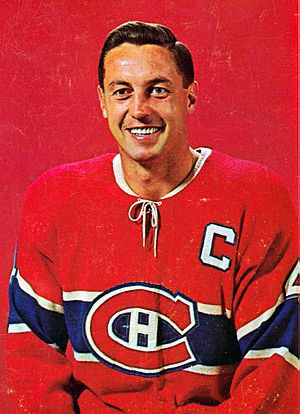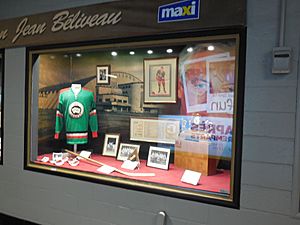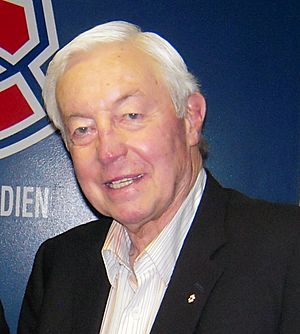Jean Béliveau facts for kids
Quick facts for kids Jean BéliveauCC GOQ |
|||
|---|---|---|---|
| Hockey Hall of Fame, 1972 | |||

Béliveau with the Montreal Canadiens in the 1960s
|
|||
| Born | August 31, 1931 Trois-Rivières, Quebec, Canada |
||
| Died | December 2, 2014 (aged 83) Longueuil, Quebec, Canada |
||
| Height | 6 ft 3 in (191 cm) | ||
| Weight | 205 lb (93 kg; 14 st 9 lb) | ||
| Position | Centre | ||
| Shot | Left | ||
| Played for | Montreal Canadiens | ||
| Playing career | 1950–1971 | ||
Joseph Jean Arthur Béliveau (born August 31, 1931 – died December 2, 2014) was a super famous Canadian ice hockey player. He played for the National Hockey League's (NHL) Montreal Canadiens for 20 seasons, from 1950 to 1971. He was so good that he was put into the Hockey Hall of Fame in 1972.
Many people think "Le Gros Bill" (which means "Big Bill" in French) Béliveau is one of the ten greatest NHL players of all time. He was born in Trois-Rivières, Quebec. Béliveau first played professional hockey in the Quebec Major Hockey League (QMHL). He joined the Canadiens in 1950 but stayed in the QMHL until 1953.
By his second year in the NHL, Béliveau was one of the best scorers. He was the fourth player to score 500 goals. He was also the second player to reach 1,000 points. Béliveau won two Hart Memorial Trophies as the league's best player (MVP) in 1956 and 1964. He also won one Art Ross Trophy as the top scorer in 1956. He won the very first Conn Smythe Trophy as the best player in the playoffs in 1965.
Jean Béliveau has won 17 Stanley Cup championships, more than anyone else! All of these wins were with the Montreal Canadiens. He won 10 Stanley Cups as a player. After he retired, he won 7 more as an executive for the team. In 2017, he was named one of the '100 Greatest NHL Players' in history.
Contents
Growing Up and Learning Hockey
Like many hockey players back then, Jean Béliveau's family had an ice rink in their backyard. This is where Jean learned to play hockey with his friends and neighbors. He played on this family rink until he was twelve years old.
His first organized team was at L'Académie, his school. He played on the school's rink. Jean also played for a special "all-star" team from L'Académie against other local teams. When he was fifteen, he went to college and played for its team, as well as for an intermediate team called the Victoriaville Panthers.
In the summer, Jean Béliveau loved to play baseball. He was a great player in local leagues in Victoriaville. He was a pitcher and sometimes played in the infield. He was so good that his family even turned down an offer for him to play professional minor-league baseball when he was just fifteen! At sixteen, Jean played for a senior league team in Val-d'Or, Quebec.
Jean Béliveau's Amazing Hockey Career
Jean Béliveau was already a star player when he was only 15. The general manager of the Canadiens, Frank Selke, noticed him. Selke wanted Béliveau to sign a special contract called a "C-form." This contract would mean Béliveau had to join the Canadiens later at a set salary. But Jean's father didn't agree.
Instead, Béliveau signed a "B-form." This meant he would play for Montreal only if he decided to become a professional player. He was called up to play a few games for the Canadiens in the 1950–51 and 1952–53 seasons. He played the most games an amateur player could play at the professional level. In 1953, he led the Quebec Senior Hockey League in scoring.
However, Béliveau didn't seem very interested in playing professionally full-time. So, Frank Selke had a clever idea. The Canadiens' owners bought the QSHL and changed it from an amateur league to a minor professional league. This meant Béliveau became a professional player, and under his "B-form" contract, he had to join the Canadiens for the 1953–54 NHL season.
Retirement and Records
Jean Béliveau retired after the 1970–71 NHL season. When he retired, he was the Canadiens' all-time leader in points. He was also second in goals for the team. He was the NHL's all-time leading playoff scorer. He scored 507 goals and had 712 assists, for a total of 1,219 points in 1,125 regular-season NHL games. In 162 playoff games, he scored 79 goals and had 97 assists, totaling 176 points.
His jersey number, #4, was officially retired by the Canadiens on October 9, 1971. This means no other player on the Canadiens can wear that number. In 1972, he was welcomed into the Hockey Hall of Fame. Today, he is the second all-time leading scorer for the Canadiens, right after Guy Lafleur. Only Henri Richard and Larry Robinson played more games for the Canadiens than Béliveau.
Béliveau's name is on the Stanley Cup a record seventeen times! This includes seven times as an executive for the Canadiens after he stopped playing. He won the Hart Trophy twice as the league's MVP. He also finished second in MVP voting four other times, and third once. He won the Art Ross Trophy once as the leading scorer. He also finished second twice and third four times. This shows how consistently great he was throughout his career. In 1998, The Hockey News magazine named Béliveau the seventh greatest NHL player ever. After he retired, the Canadiens made him a vice president and director of public relations.
Jean Béliveau was known for standing up for what he believed was right. For example, he was one of several players who said they would leave the Hockey Hall of Fame if a former hockey executive, Alan Eagleson, was allowed to stay after he was found guilty of serious financial crimes. Béliveau also supported the NHL during a player dispute in 2004-05. He felt that the players' demands would hurt the sport and the league.
Life After Hockey and Later Years
Jean Béliveau met his wife, Elise Couture, in Quebec City in 1950. They got married on June 27, 1953, and had one daughter named Hélène. In 1957, Béliveau even appeared on an American TV game show called To Tell the Truth in his full hockey uniform!
After he retired as a player in 1971, Béliveau started a charity called the Jean Béliveau Foundation. In 1993, he transferred this foundation to the Society for Disabled Children, helping many kids.
In the early 1990s, he was offered a job in the Canadian government twice by Prime Minister Brian Mulroney. He was asked to become a member of the Senate of Canada. But Béliveau said no because he believed that lawmakers should only be chosen by voters. In 1994, Prime Minister Jean Chrétien offered him the important job of Governor General of Canada. Béliveau turned this down too. He wanted to spend more time with his daughter and his two granddaughters, Mylene and Magalie. Their father, who was a police officer, had passed away when the girls were very young.
Starting in the 1990s, Béliveau had some health problems. He was first hospitalized for heart issues in 1996. In 2000, he was treated for a growth in his neck. In 2010 and again in 2012, he was hospitalized after having strokes.
Jean Béliveau passed away on December 2, 2014, at the age of 83, in a town near Montreal. His public funeral was held at Mary Queen of the World Cathedral in Montreal.
Jean Béliveau's Legacy and Honors

Jean Béliveau received many awards and honors throughout his life. He was given special degrees from Canadian universities. He also received the Loyola Medal from Concordia University in 1995.
He was made a Knight of the National Order of Quebec in 1988. He was promoted to Officer in 2006 and then to Grand Officer in 2010. On May 6, 1998, Governor General Roméo LeBlanc made Béliveau a Companion of the Order of Canada. This is the highest award a civilian can receive in Canada.
In 2001, his name was added to Canada's Walk of Fame. In the same year, he was honored with his picture on a Canadian postage stamp. In August 2008, the Canadian Pacific Railway named a train station after him. On June 29, 2009, he was named an honorary captain of the men's national team for the 2010 Winter Olympics.
On Friday, December 4, 2014, the Montreal Canadiens started sewing a special patch onto their jerseys. This patch had the number "4" in a black circle on the left side of the jersey, honoring Jean Béliveau.
Career statistics
| Regular season | Playoffs | |||||||||||||
|---|---|---|---|---|---|---|---|---|---|---|---|---|---|---|
| Season | Team | League | GP | G | A | Pts | PIM | GP | G | A | Pts | PIM | ||
| 1947–48 | Victoriaville Tigres | QJHL | 42 | 46 | 21 | 67 | — | — | — | — | — | — | ||
| 1948–49 | Victoriaville Tigres | QJHL | 42 | 48 | 27 | 75 | 54 | 4 | 4 | 2 | 6 | 2 | ||
| 1949–50 | Quebec Citadelles | QJHL | 35 | 36 | 44 | 80 | 47 | 14 | 22 | 9 | 31 | 15 | ||
| 1950–51 | Quebec Citadelles | QJHL | 46 | 61 | 63 | 124 | 120 | 22 | 23 | 31 | 54 | 76 | ||
| 1950–51 | Quebec Aces | QMHL | 1 | 2 | 1 | 3 | 0 | — | — | — | — | — | ||
| 1950–51 | Montreal Canadiens | NHL | 2 | 1 | 1 | 2 | 0 | — | — | — | — | — | ||
| 1951–52 | Quebec Aces | QMHL | 59 | 45 | 38 | 83 | 88 | 15 | 14 | 10 | 24 | 14 | ||
| 1952–53 | Quebec Aces | QMHL | 57 | 50 | 39 | 89 | 59 | 19 | 14 | 15 | 29 | 25 | ||
| 1952–53 | Montreal Canadiens | NHL | 3 | 5 | 0 | 5 | 0 | — | — | — | — | — | ||
| 1953–54 | Montreal Canadiens | NHL | 44 | 13 | 21 | 34 | 22 | 10 | 2 | 8 | 10 | 4 | ||
| 1954–55 | Montreal Canadiens | NHL | 70 | 37 | 36 | 73 | 58 | 12 | 6 | 7 | 13 | 18 | ||
| 1955–56* | Montreal Canadiens | NHL | 70 | 47 | 41 | 88 | 143 | 10 | 12 | 7 | 19 | 22 | ||
| 1956–57* | Montreal Canadiens | NHL | 69 | 33 | 51 | 84 | 105 | 10 | 6 | 6 | 12 | 15 | ||
| 1957–58* | Montreal Canadiens | NHL | 55 | 27 | 32 | 59 | 93 | 10 | 4 | 8 | 12 | 10 | ||
| 1958–59* | Montreal Canadiens | NHL | 64 | 45 | 46 | 91 | 67 | 3 | 1 | 4 | 5 | 4 | ||
| 1959–60* | Montreal Canadiens | NHL | 60 | 34 | 40 | 74 | 57 | 8 | 5 | 2 | 7 | 6 | ||
| 1960–61 | Montreal Canadiens | NHL | 69 | 32 | 58 | 90 | 57 | 6 | 0 | 5 | 5 | 0 | ||
| 1961–62 | Montreal Canadiens | NHL | 43 | 18 | 23 | 41 | 36 | 6 | 2 | 1 | 3 | 4 | ||
| 1962–63 | Montreal Canadiens | NHL | 69 | 18 | 49 | 67 | 68 | 5 | 2 | 1 | 3 | 2 | ||
| 1963–64 | Montreal Canadiens | NHL | 68 | 28 | 50 | 78 | 42 | 5 | 2 | 0 | 2 | 18 | ||
| 1964–65* | Montreal Canadiens | NHL | 58 | 20 | 23 | 43 | 76 | 13 | 8 | 8 | 16 | 34 | ||
| 1965–66* | Montreal Canadiens | NHL | 67 | 29 | 48 | 77 | 50 | 10 | 5 | 5 | 10 | 6 | ||
| 1966–67 | Montreal Canadiens | NHL | 53 | 12 | 26 | 38 | 22 | 10 | 6 | 5 | 11 | 26 | ||
| 1967–68* | Montreal Canadiens | NHL | 59 | 31 | 37 | 68 | 28 | 10 | 7 | 4 | 11 | 6 | ||
| 1968–69* | Montreal Canadiens | NHL | 69 | 33 | 49 | 82 | 55 | 14 | 5 | 10 | 15 | 8 | ||
| 1969–70 | Montreal Canadiens | NHL | 63 | 19 | 30 | 49 | 10 | — | — | — | — | — | ||
| 1970–71* | Montreal Canadiens | NHL | 70 | 25 | 51 | 76 | 40 | 20 | 6 | 16 | 22 | 28 | ||
| NHL totals | 1,125 | 507 | 712 | 1,219 | 1,029 | 162 | 79 | 97 | 176 | 211 | ||||
- Stanley Cup Champion.
Awards and honours
| Award | Year | Ref. |
|---|---|---|
| Played in the NHL All-Star Game | 13x between 1953 and 1969 | |
| First team All-Star | 1954–55, 1955–56 1956–57, 1958–59 1959–60, 1960–61 |
|
| Second Team All-Star | 1957–58, 1963–64 1965–66, 1968–69 |
|
| Art Ross Trophy | 1955–56 | |
| Hart Memorial Trophy | 1955–56, 1963–64 | |
| Conn Smythe Trophy | 1964–65 | |
| NHL Lifetime Achievement Award | 2009 | |
| 10x Stanley Cup winner | 1956, 1957, 1958, 1959, 1960, 1965, 1966, 1968, 1969, 1971 |
See also
 In Spanish: Jean Béliveau para niños
In Spanish: Jean Béliveau para niños
- List of NHL players with 500 goals
- List of NHL players with 1,000 points
- List of NHL players with 1,000 games played
- List of NHL statistical leaders
- List of members of the Hockey Hall of Fame
- List of NHL players who spent their entire career with one franchise
 | John T. Biggers |
 | Thomas Blackshear |
 | Mark Bradford |
 | Beverly Buchanan |


